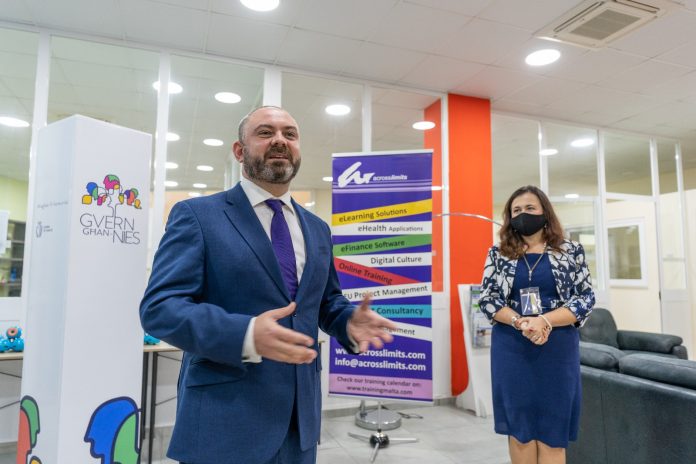A company based in Naxxar has successfully promoted European Union opportunities to clients all over Europe ranging from governments, businesses, NGOs, and academia through the building of partnerships that work in the field of research and innovation. It has also acted as a contractor to the European Commission and its agencies on various projects.
The company, AcrossLimits, has been in operation for the last 20 years and employs 11 people in Malta and over 40 experts globally in different technology domains including ICT, greentech, medtech and policy development.
Minister Owen Bonnici visited the main offices of the company as part of ‘Gvern għan-Nies’, where he met the Director Ms Angele Giuliano. During the meeting, which coincided with the day of the launch of the European Innovation Council, Dr Bonnici was provided with an overview of the company and a number of research projects in which AcrossLimits has been directly participating in.
Minister Bonnici said that AcrossLimits is living proof that Malta can be an active partner on a European level in the field of research and innovation and can also make a marked difference. “We want to build a robust ecosystem of innovation in our country and this company clearly shows that we can actually make a difference not only to local entities but also on a European level”. He mentioned three key projects in which AcrossLimits has an active role that is making an impact on a European level: the ITAMA project, the BioExcel2 Centre of Excellence for Computational Biomolecular Research project and the ER4STEM project.
The ITAMA project, funded by INTERREG V-A Italia-Malta program is under the lead of the Department of Physics and Chemistry of the University of Palermo with the involvement of the University of Messina, Mater Dei Hospital, and the Maltese Ministry for Health.
The overall objective of ITAMA is to activate a network between research and productive environments in the healthcare sectors to develop innovative ICT Tools for the non-invasive diagnosis of Autoimmune diseases. The data collection part of the study is based upon the screening of 22,000 patients for Coeliac Disease, possibly before the symptoms develop (20,000 children aged between 4 and 12 years in Malta and 2,000 patients in Sicily). So far 12,000 Maltese children have been screened and testing is planned to continue along the current year. This screening is made up of 2 components: a Point of Care test (a simple test using a drop of blood from a finger) and a questionnaire of symptoms scientifically associated with coeliac disease. This data will be fed into a decision support system, developed by ITAMA, that will eventually be able to assess whether Coeliac Disease is present in a patient without the need for invasive and expensive tests like endoscopy.
The BioExcel2 Centre of Excellence for Computational Biomolecular Research project, funded by Horizon 2020, uses high-performance computers to compute simulations and calculations that help the creation of new pharmaceuticals. Since the experimentation is done in silico, there is less need to do tests on animals and humans, and this speeds up the pharmaceutical development cycle. A portal collects all information on this project, www.bioexcel.eu and the same project was awarded the Best Impact on Health, Security or Smart Mobility Award in the Horizon 2020 Award Scheme organised by MCST.
The Educational Robotics for Science, Technology, Engineering and Maths (ER4STEM) project, funded also by Horizon 2020, aimed at making the idea of science and technology more entertaining for students. 5,000 different students around Europe were taught how to program little robots to teach them structured programming, including 900 students from Malta. This project won the Best Promotion of STEM Award in the Horizon 2020 Award Scheme organised by MCST.
Ms Giuliano said, “As a company, we have been always engaged in the European Research and Innovation space since 2001. Thanks to our knowledge we have helped both public and private clients achieve their goals of better technology to serve health, education, and the environment. Being Maltese was an advantage in many ways, as we could harness our rigorous technology background with Mediterranean-style networking, and this definitely got us noticed”.
“Most of our clients are in fact from the Netherlands, Belgium, and the Nordics and these countries are always looking for business collaborations with the South of Europe in different industries like maritime, green and ICT services. Given that today is also the launch of the European Innovation Council, which will invest over €10 billion in the next 7 years, there has never been a better time to start engaging in research and deep tech in Europe. As the Malta European Innovation Council Champion, I am committed to promote and support where possible our local ecosystem to reach its full potential”, Ms Giuliano concluded.
Photo (MRIC)










